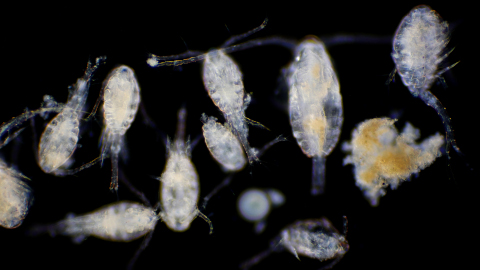Anthropogenic climate change already affects the production of marine plankton populations

Anthropogenic climate change is already affecting the marine plankton populations present in the western Mediterranean Sea. This is the result of a study led by the ICTA-UAB that warns on the increasing surface ocean temperature lowering organic matter production, which has negative impacts on plankton communities and marine biodiversity.
26/07/2021
The study, carried out in collaboration with researchers from the Spanish Council for Scientific Research (CSIC) in Barcelona (Spain), the Max Planck Institute of Chemistry (MPIC) in Mainz (Germany), and the University of Palermo (Italy) and published in Global and Planetary Change, compares the impact of natural climate change variability versus anthropogenic global warming.
To do this, they studied records from the 10th century up to the present of a type of common marine calcifying zooplankton known as planktic foraminifera present in the area of the Balearic Islands and the Alboran Sea. Planktic foraminifera are single celled organisms, living in the upper ocean, responding sensitively to climate and environmental changes. They build a shell made of calcium carbonate and are of several hundreds of micrometers in size. The species-specific shape and the robustness of the shell, makes them an ideal tool with which to reconstruct past environmental changes, including over long geological time-periods.
The researchers selected the western Mediterranean Sea as the study area since it is a region especially affected by anthropogenic pressure and climate change. Anthropogenic warming occurs more abruptly in the Mediterranean region compared to the global average, affecting marine plankton communities. "Since 1880, atmospheric warming has been greater, accelerating the increase of sea surface temperature at a rate of 0.35° C per decade", says Sven Pallacks, ICTA-UAB researcher and lead author of the study.
The researchers discovered that, at times before anthropogenic carbon dioxide (CO2) emissions led to enhanced ocean warming (prior to 1880, according to records), alterations in planktic foraminifera were mainly driven by natural variability. Large-scale atmospheric phenomena – known as the North Atlantic Oscillation – are associated with changes in wind patterns in the region, which drive oceanographic changes, thus altering the habitat of the plankton community. In contrast, during the past ca. 150 years, unprecedented anthropogenic warming of the western Mediterranean Sea has reduced the planktic foraminiferal stock. At the same time, changes in species composition are indicating that the biological productivity of the western Mediterranean diminished.
This study matters since it demonstrates the alteration of marine production under anthropogenic climate and describes a reference state of the Mediterranean ecosystem prior to anthropogenic warming, stated Patrizia Ziveri, leading the research project on planktic calcifiers in the Mediterranean. At the same time, the study shows to which extent anthropogenic warming has affected parts of the plankton community. As they serve as an indicator for primary production, planktic foraminifera are an important tool to detect biological productivity exceeding time scales of classical monitoring programs. “Calcite-shelled organisms play a crucial role in atmospheric CO2 modulation; therefore it is important to get a better understanding of which factors are controlling the planktic foraminiferal abundance”, adds Pallacks.
The results of the study can be seen as a sign of reduced marine productivity caused by anthropogenic warming. A less productive Mediterranean Sea would affect the food web complexity and fish stocks as well as biodiversity, causing a degradation of ecosystem services in the Mediterranean. Together with overfishing, a reduced marine productivity as a result of anthropogenic warming further threatens the rapidly changing Mediterranean Sea ecosystems and natural resources, highlighting once again the need of protecting this sea, adapting and first of all addressing the mitigation of climate change.
Research paper:
Pallacks, S., Ziveri, P., Martrat, B., Mortyn, P.G., Grelaud, M., et al. 2021. Planktic foraminiferal changes in the western Mediterranean Anthropocene. Global and Planetary Change. https://doi.org/10.1016/j.gloplacha.2021.103549